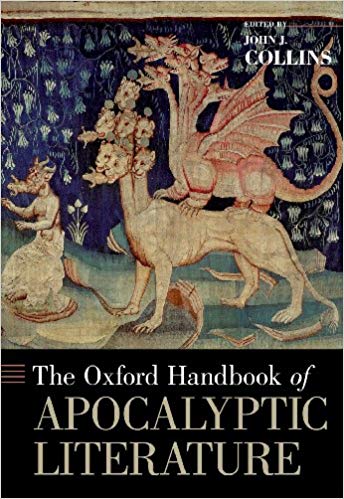File:2014-E * Collins.jpg
2014-E_*_Collins.jpg (344 × 499 pixels, file size: 47 KB, MIME type: image/jpeg)
{en} The Oxford Handbook of Apocalyptic Literature (2014) is a volume edited by John J. Collins.
Abstract
"Apocalypticism arose in ancient Judaism in the last centuries BCE and played a crucial role in the rise of Christianity. It is not only of historical interest: there has been a growing awareness, especially since the 2001 terrorist attacks on the United States, of the prevalence of apocalyptic beliefs in the contemporary world. To understand these beliefs, it is necessary to appreciate their complex roots in the ancient world, and the multi-faceted character of the phenomenon of apocalypticism. The Oxford Handbook of Apocalyptic Literature is a thematic and phenomenological exploration of apocalypticism in the Judaic and Christian traditions. Most of the volume is devoted to the apocalyptic literature of antiquity. Essays explore the relationship between apocalypticism and prophecy, wisdom and mysticism; the social function of apocalypticism and its role as resistance literature; apocalyptic rhetoric from both historical and postmodern perspectives; and apocalyptic theology, focusing on phenomena of determinism and dualism and exploring apocalyptic theology's role in ancient Judaism, early Christianity, and Gnosticism. The final chapters of the volume are devoted to the appropriation of apocalypticism in the modern world, reviewing the role of apocalypticism in contemporary Judaism and Christianity, and more broadly in popular culture, addressing the increasingly studied relation between apocalypticism and violence, and discussing the relationship between apocalypticism and trauma, which speaks to the underlying causes of the popularity of apocalyptic beliefs."--Publisher description.
Editions
Published in New York, NY: Oxford University Press, 2014.
Contents
What is apocalyptic literature? / John J. Collins -- Apocalyptic prophecy / Stephen L. Cook -- The inheritance of prophecy in apocalypse / Hindy Najman -- Wisdom and apocalypticism / Matthew Goff -- Scriptural interpretation in early Jewish apocalypses / Alex P. Jassen -- Apocalyptic literature and the study of early Jewish mysticism / Ra`anan Boustan and Patrick G. McCullough -- Dreams and visions in early Jewish and early Christian apocalypses and apocalypticism / Frances Flannery -- Social-scientific approaches to apocalyptic literature / Philip F. Esler -- Jewish apocalyptic literature as resistance literature / Anathea Portier-Young -- Apocalypse and empire / Steven J. Friesen -- A postcolonial reading of apocalyptic literature / Daniel L. Smith-Christopher -- The rhetoric of Jewish apocalyptic literature / Carol A. Newsom -- Early Christian apocalyptic rhetoric / Greg Carey -- Deconstructing apocalyptic literalist allegory / Erin Runions -- Apocalyptic determinism / Mladen Popovic -- Apocalyptic dualism / Jörg Frey -- Apocalyptic ethics and behavior / Dale C. Allison, Jr. -- Apocalypse and Torah in ancient Judaism / Matthias Henze -- Apocalypticism and Christian origins / Adela Yarbro Collins -- Descents to hell and ascents to heaven in apocalyptic literature / Jan N. Bremmer -- Apocalypses among gnostics and Manichaeans / Dylan M. Burns -- The imagined world of the apocalypses / Stefan Beyerle -- Messianism as a political power in contemporary Judaism / Motti Inbari -- Apocalypticism and radicalism / Christopher Rowland -- Apocalypse and violence / Catherine Wessinger -- Apocalypticism in contemporary Christianity / Amy Johnson Frykholm -- Apocalypse and trauma / Dereck Daschke -- Apocalypticism and popular culture / Lorenzo DiTommaso.
External links
- [ Google Books]
File history
Click on a date/time to view the file as it appeared at that time.
| Date/Time | Thumbnail | Dimensions | User | Comment | |
|---|---|---|---|---|---|
| current | 10:09, 20 October 2019 |  | 344 × 499 (47 KB) | Gabriele Boccaccini (talk | contribs) |
You cannot overwrite this file.
File usage
There are no pages that use this file.
